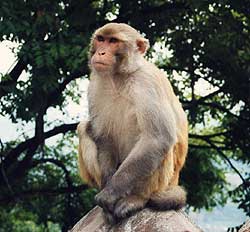 Following the Indian ban on the export of rhesus monkeys for use in bio-medical research, Western research labs now seem to be eyeing Nepali monkeys.
Following the Indian ban on the export of rhesus monkeys for use in bio-medical research, Western research labs now seem to be eyeing Nepali monkeys. Two years ago the private Natural History Society (NHS) in Kathmandu put forward a proposal to provide monkeys to foreign labs, but dropped it after conservation activists, particularly the King Mahendra Trust for Nature Conservation created a furore. Mukesh Chalise of NHS doesn't understand the fuss: "We are not talking about selling our monkeys, we just want to provide scientists with primates to conduct studies. It would contribute to the whole of humanity."
This time, activists allege, the Washington National Primate Centre (WNPC) and its Nepali counterpart, NHS, have decided to come through the back door. A group of US researchers led by Randall Kyes of WNPC conducted a five-day 'health camp' for rhesus on Swayambhu Hill where 20 monkeys were said to have died from a mysterious epidemic.
But this was apparently done without permission from the government's Department of National Park and Wildlife Conservation. During that time, they collected stool, blood and hair from more than 40 monkeys and flew back to Washington, their activities still largely unknown. "This is a case of bio-piracy," says a source at WWF (World Wildlife Fund for Nature Conservation) Nepal Chapter. Our email queries to Randall Kyes went unanswered.
For over 30 years, the WNPC has been active in primate research overseas. The centre maintains a breeding colony housing over 1,000 monkeys in Indonesia and also works with the Institute of Medical Primatology in Russia. At the American Society of Primatologists annual conference held in June last year, Randall Kyes is said to have expressed WNPC's interest to establish a monkey-breeding centre in Nepal to ensure the availability of non-human primates for bio-medical research.
Nepal does not have a law on the export of laboratory animals, but a1973 law empowers the government to fine or imprison up to two years anyone found guilty of trying to "harm wild animals for any purpose". The chief of the Department of National Park, Swayambhu Man Amatya, maintains that his office is not aware of any activities conducted by WNPC in Kathmandu recently.
Meanwhile, the International Primate Protection League (IPPL) has posted an appeal in its site www.ippl.org to protest plans to exploit Nepali primates, and has also requested Nepal not to allow monkey-breeding labs to be set up.
India banned the export of rhesus monkeys in 1977 on the grounds that they are worshiped as the god, Hanuman. China is the biggest exporter of monkeys for bio-medical research, while the US is the biggest importer of primates with an annual intake of about 14,000 primates.


